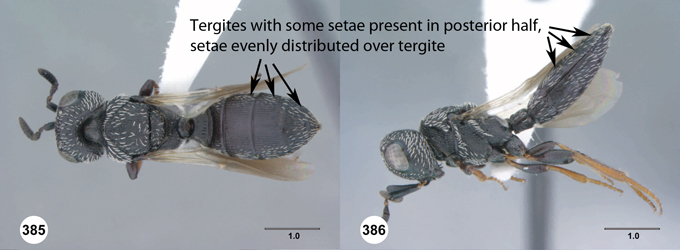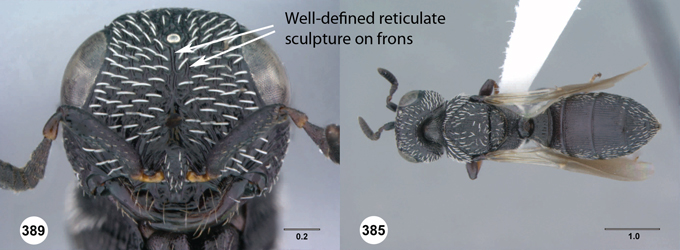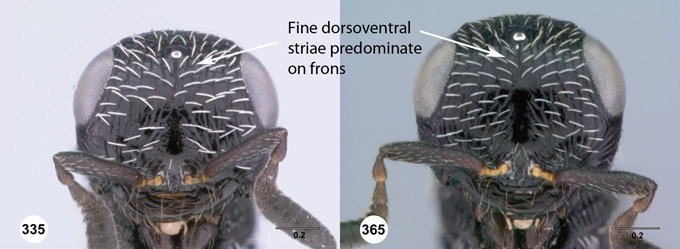
1. Metasomal tergites 2–5 in lateral profile covered
with dense pilosity in anterior half, strongly contrasting with the
glabrous or very sparsely setose posterior half (Fig. 392) ... Scelio striatus

– Metasomal tergites 2–5 in lateral profile with at least some setae
present in posterior half, if sparse in posterior half then
uniformly sparse throughout ... 2

2. Frons below and surrounding anterior ocellus with well-defined
reticulate sculpture (Fig. 389, note that several other
species from the Arabian Peninsula possess this character, and may
overlap in distribution) ... Scelio retifrons

– Frons below and surrounding anterior ocellus with fine dorsoventral
striae, rarely some slight reticulation among striae, but
in this case dorsoventral striae clearly predominate (Figs 335,
365) ... 3

3. Gena strongly bulging (Fig. 381), in dorsal view usually extending
laterad of eye, head very wide across mandibles (Fig.
383); medial anteclypeus very short and concave, with two acute
triangular teeth at margins (Fig. 383, lat); pilosity of
lateral metasoma sparse (Fig. 384); striae on frons dense; scutellum
with fine longitudinal striae (Fig. 381); T5
often appearing slightly pinched, with a relatively well-developed
median crease; anterolateral T3 with a large patch of
appressed microtrichia; lateral S2–S5 predominantly sculptured ... Scelio remaudierei

– Gena slightly bulging or simply rounded
(Fig. 376), not extending laterad of eye,
head moderately wide across mandibles; medial
anteclypeus variously developed though typically not with distinct acute
triangular teeth at margins (Fig. 377); pilosity of metasoma
rarely sparse, typically moderate to dense (Fig. 378) ... 4
4. Anteclypeus medially projecting (Figs 347, 377); posteroventral
quadrant of metapleuron densely setose (4 or more
setae) (Fig. 346, 376) ... 5
– Anteclypeus medially striplike (linear) to concave (e.g. Figs 335,
365, 401); posteroventral quadrant of metapleuron
sparsely setose (1–3 originating setae) ... 6
5. Anteclypeus medially broadly lobed (Fig. 347), without sculpture (pilosity
throughout often slightly wavy) ... Scelio
clypeatus
– Anteclypeus strongly projecting, apical margin truncate to very
slightly convex, with irregular sculpture (Fig. 377) ...
Scelio quasiclypeatus
6. Posterodorsal portion of head with some smooth patches formed by
irregularly obliterated sculpture (Fig. 325); dorsal
surface of anterolateral T3 with a patch of micropilosity (best seen in
dorsolateral view, Fig. 336, t3p); pilosity of head and
mesoscutum predominantly white, mesoscutellar setae brown (Fig. 333);
pronotal nucha with some areas distinctly smooth
(anteclypeus almost always concave and quite short, though in some
appearing truncate at some angles, Fig. 335) ... Scelio
afer
– Posterodorsal portion of head sculptured throughout, if with
obliterated patches (rarely), then pronotal nucha well
sculptured throughout; dorsal surface of anterolateral T3 with or
without micropilosity; color of pilosity on head and dorsal
mesonotum varying; sculpture of pronotal nucha varying, but in most
sculptured throughout ... 7
7. Anteclypeus medially truncate (e.g. Figs 365, 371), if irregularly
concave medially (typically smaller individuals), then
medial teeth absent (Fig. 383) ... 8
– Anteclypeus medially concave (e.g. Figs 335, 401) ... 10
8. Pilosity of lateral T3–T5 absent anteriorly such that no part of the
anterior margin has nearby adjacent setae (Fig. 342);
pilosity of posteroventral quadrant of metapleuron moderately dense,
typically with 3 or more setae present (Fig. 340)
(anteclypeus quite small, Fig. 341, sometimes with a hint of medial
concavity; mesosoma typically with 7 or more brown
setae) ... Scelio apospastos
– Pilosity of lateral T3–T5 reaching the anterior margin, at least along
lateral margin; pilosity of posteroventral quadrant of
metapleuron sparse, typically 1-2 setae present ... 9
9. Pilosity of mesoscutum completely white, or with at most a single
pair of brown setae along posteromedial margin (Fig.
369); anteclypeus well developed, often projecting medially (Fig. 371);
T1 laterally with two types of setae present, finer
setae forming a complete patch from the anterior to the posterior;
lateral T2–T5 densely setose, setae predominantly
white ... Scelio pilosilatus
– Pilosity of mesoscutum often predominantly brown, with more than two
brown setae medially (Fig. 363); anteclypeus
small, striplike, sometimes with anterior margin slightly irregular; T1
laterally with predominantly thicker setae, if fine setae
present then not forming a complete dense line from the anterior to the
posterior; pilosity of lateral T2–T5 moderately dense
to somewhat sparse; pilosity of T4–T5 at least partially (often
completely) composed of fine brown to golden-brown setae
(widespread and somewhat polymorphic, includes several series of
tentatively included individuals, see comments) ...
Scelio modulus
10. Metasomal pilosity on T3–T5 white, thick, concolorous with pilosity
of T2; oxter nearly always with a relatively large
glabrous and smooth patch along dorsal margin; pilosity of the head and
mesonotum with at least some white setae ... 11
– Metasomal pilosity on T3–T5 very fine, brown, contrastingly lighter
than that of T2; oxter sculptured throughout; pilosity
of the head and mesonotum completely brown, concolorous (Kenya, Rwanda)
... Scelio concavus
11. Pilosity of head, mesonotum not concolorous, distinctly multicolored
on mesoscutum, and dark throughout
mesoscutellum (Fig. 357); pronotal nucha predominantly smooth
throughout; mesoscutum with relatively large
reticulations; mesoscutum and mesoscutellum more transverse (Fig. 357,
width of mesoscutum 1.5x length, width of
mesoscutellum 2.3x length) (west Africa) ... Scelio erugatus
– Pilosity of dorsal head and mesonotum concolorous; pronotal nucha
sculptured throughout; mesoscutum with moderately
sized reticulations (Fig. 399); mesoscutum and mesoscutellum more
elongate (Fig. 399, width of mesoscutum 1.1x
length, width of mesoscutellum 1.1x length) (Madagascar) ... Scelio
tritus
|